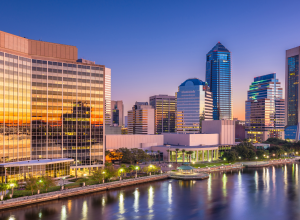Jacksonville economy continues to show promise in latest CABS survey
Writer: Pablo Marquez
 October 2024 — Jacksonville’s business leaders have continued to express a positive outlook on their local economy, as the city finds new opportunities to grow and diversify its industry base.
October 2024 — Jacksonville’s business leaders have continued to express a positive outlook on their local economy, as the city finds new opportunities to grow and diversify its industry base.
According to the Q3 CABS survey, which included more than 40 Jacksonville public and private sector leaders, respondents ranked the strength of their regional economy at 4.16 out of 5. The latest data follows the same trend last quarter, where regional economic sentiment was 4.18.
The ‘Gateway to Florida’ has been at the forefront of the region’s development across multiple sectors and industries, including banking and financial services, commercial and residential real estate and construction, healthcare, advanced manufacturing, and transportation and logistics. There are also a handful of projects and developments driving growth both in downtown Jacksonville and outlying areas. The Jacksonville Jaguars unveiled plans to renovate EverBank Stadium, which should secure the NFL’s presence in Northeast Florida for the next 30 years. Additionally, the construction of four hotels so far this year shows that the industry is going against the national trends related to hotel development.
Jacksonville’s business growth has been attributed to key factors such as population growth, corporate relocations and expansions, and developments taking place along the St. Johns River. Jacksonville is still a relatively fresh market, and despite having the largest landmass of any city in the state of Florida, there is still plenty of unaccounted land and room for growth where new projects and developments can and will be built.
Business leaders in Jacksonville, including Mark Lamping, president of the Jacksonville Jaguars; Diana Donovan, executive director of the Cultural Council of Greater Jacksonville; Bryan Moll, CEO of Gateway Jax; and Maria McDaniels, managing director of Florida Capital Bank, shared their insights on how the River City is growing from their eyes.
Mark Lamping, President, Jacksonville Jaguars
We’re already seeing that impact. If you view the stadium as simply the home for an NFL team, and if the end result is just a new stadium, then as a community, we missed a huge opportunity. During the construction phase alone, you’re creating thousands of jobs for residents to work and using local companies. The economic benefits are being felt and things are being allowed to grow and prosper. And when you get through the construction period, permanent jobs are created both directly through the stadium and the surrounding development. You are already seeing that development happening outside the stadium location. In fact, the single largest private investment in downtown Jacksonville, besides the stadium, is happening right across the street. It’s the development of a new Four Seasons Hotel and Private Residences, office building and a publicly owned marina and support building.
We’re seeing the impact as it relates to other activities. The community-owned stadium is not designed just for NFL games, it’s designed to bring other events to Jacksonville along with the economic impact that those events represent. As Jacksonville grows, so will the Jaguars. There’s no question that while Jacksonville is one of the smallest communities with an NFL team, it’s also one of the fastest growing. That growth in Jacksonville is pretty much across the board: not just people moving here but people staying here, companies relocating, and existing companies adding jobs. It’s a much more economically vibrant community than it has been in the past, and since most of our customers are sourced locally, it certainly benefits the Jaguars.
 Diana Donovan, Executive Director, Cultural Council of Greater Jacksonville
Diana Donovan, Executive Director, Cultural Council of Greater Jacksonville
A thriving Downtown area is intrinsically linked to a vibrant arts and culture scene. For instance, an event at the Florida Theatre not only energizes nearby restaurants, ride-sharing services, bars, and parking facilities but also supports the artists and theater staff involved. The economic impact of such events generates significant local benefits. Our investment in arts and culture has yielded an impressive return on investment of over $114 million, with $105.7 million of this amount benefiting Downtown Jacksonville. This includes contributions from arts and culture nonprofits, such as the Jacksonville Symphony, MOSH, and the Cummer Museum, who are supported through the city of Jacksonville’s Cultural Service Grant Program.
It’s exciting to see multi-million-dollar investments coming back to a city that is a thriving metropolis. The future of the city lies with the Jacksonville Jaguars, autonomous vehicles and Downtown development to curate places where people want to eat, play, and stay. Arts and culture is the thread that runs through them all and plays a pivotal role in giving our residents a better quality of life and our visitors a reason to come back. When we talk about numbers, we want our community to understand how they contribute to that bottom line and how the value is returned to them.
Bryan Moll, Chief Executive Officer, Gateway Jax
In April, the Wall Street Journal named Jacksonville the No. 2 job market after it had been number four two years prior, and number three last year. That data reinforces what a consistently strong job market Jacksonville has. A lot of the jobs being created are in very well-paying fields that require a well-educated workforce. When you’re a developer, in particular, job growth is key to being able to promote successful developments in terms of new apartment development, with new renters moving in and new condo buyers coming into the market. Job growth is the backbone of the successful development world.
In general, I think things couldn’t be better now, nor point to a brighter future. Florida continues to be one of the top states for growth in the nation; it has a great quality of life, a great business environment, and no state income tax –– it’s a fantastic place to live. I truly believe that Florida is going to be one of the top states for businesses for decades to come. If you look at the areas in Florida that have the most opportunity for growth, and you look at some of the major cities, including South Florida, Miami, on the west side in Tampa, and the central part of Orlando, a lot of those cities have been growing like crazy over the past 10 years. As they have grown, they’ve gotten more expensive to live. Jacksonville has all the same things going for it, but it also offers a great quality of life, and it’s still a relatively affordable place to live. There’s just a bright future in Jacksonville from an economic standpoint, making it a great place for the commercial real estate industry.
 Maria McDaniels, Managing Director, Florida Capital Bank
Maria McDaniels, Managing Director, Florida Capital Bank
Jacksonville continues to expand, and we have worked extremely hard as a city to revitalize our downtown to attract young talent, families and startups, as well as preserving our long-term businesses. Through our Florida markets we are contending with constant growth. This involves being able to scale with younger businesses that want to revitalize their towns and attract the right people to live in our communities. The revitalization efforts we are seeing involve cultivating community spaces meant for families and people-centered recreation instead of rows upon rows of impersonal high rises blocking out of our downtown.
We are highly focused on growing in multifaceted ways – through cultivating growth in technology, market, and people. We intend to continue expanding our footprint from the branch side as well as the specialty banking line of business. Once the regulatory chaos slows down, we will continue exploring banking as a service.
For more information visit:
https://www.floridacapitalbank.com/













